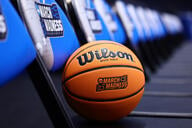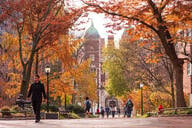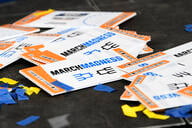You have /5 articles left.
Sign up for a free account or log in.
A federal court last week threw out a New Jersey law that legalized sports betting last year, but not before college teams were adversely affected by the National Collegiate Athletic Association’s crackdown on competition there.
The NCAA joined the major professional sports associations in suing over the legislation, signed into law by New Jersey Gov. Chris Christie in January 2012, arguing that it was a threat to competitive integrity and (in the NCAA’s case) athletes’ well-being. The U.S. government was also a party to the lawsuit, because a federal law prohibits sports betting in all but four states.
And in October, the NCAA announced that it would move five athletic championships that were scheduled to take place in New Jersey out of the state. NCAA officials said the law required the rescheduling in order for the association to honor its policies and beliefs.
The NCAA temporarily lifted its ban with Friday’s news, but for some college teams in New Jersey, damage has already been done.
The women’s basketball team at Montclair State University, for instance, was not allowed to put in a bid to host the first round of games in the annual NCAA basketball tournament. So instead of the team with a 29-0 season record potentially playing toward the championship with home court advantage, as would normally be the case under NCAA guidelines, Montclair State had to travel to Pennsylvania for the tournament’s first round. (It still won.)
“Part of the philosophy the NCAA has is trying to respect the integrity of the game and to not have it tainted by people being able to bet on it. I think everybody sort of looks at it as, this opens up the door for an opportunity for people to try and manipulate the outcome,” said Holly Gera, athletic director at Montclair State. “Whether or not Division III women’s basketball would be a hot ticket to bet on, I don’t know.”
Montclair State put in a bid to host the second round once the ban lifted, but DePauw University won out, so the team heads to Indiana on Friday to play Christopher Newport University. It’s trying to continue its record streak of most consecutive victories in a season, best start and longest winning streak in Montclair State history. The team is a contender for the division’s national title.
Considering that Christie suggested Friday that the state would appeal the ruling, it may be too soon for the NCAA to lift the ban permanently. (The NCAA did not return requests for comment.) The state contends that hundreds of millions of dollars are illegally wagered on sporting events every year, and that the law would not endanger the integrity of the sports leagues.
Although the NCAA says it issued the ban with the best interests of athletes in mind, the decree was disappointing for the seniors in fall and winter sports who were blindsided by it, said Michael W. Klein, executive director of the New Jersey Association of State Colleges and Universities.
“When you actually see it played out, you just feel bad for the student-athletes,” Klein said. “The great reward at our level, at Division III, is the home field advantage after a long season and playing well.”
Ramapo College, whose men’s basketball team was ranked first in its region, had to host tournament games at lower-quality facilities in New York, Klein said. The team at Stevens Institute of Technology did the same. In the fall season, Princeton University’s field hockey team won the Division I national championship, but had to play five tournament games on the road.
Meanwhile, other colleges that had earlier been chosen to host fall sport championships -- Montclair State, Rider University and the College of New Jersey among them -- couldn’t.
Along with losing home-court advantage, these New Jersey institutions were also denied the visitors and exposure that come with hosting championships. As well as, of course, the adrenaline rush and momentum that can come from playing in front of your own fans.
“You love to have a home game, because more people are able to make it. I’m not sure how many folks are going to be able to come out to Indiana,” Gera said. (The drive from campus to campus is about 12 hours.) But, she added, the women’s basketball team is still “rarin’ and ready to go.”
One New Jersey Star-Ledger columnist wasn’t as forgiving.
“The association, in the eyes of many, is broken and beyond fixing,” Steve Politi wrote. “But, when it comes to crushing the dreams of athletes who have done nothing wrong, it’s still the best.”




